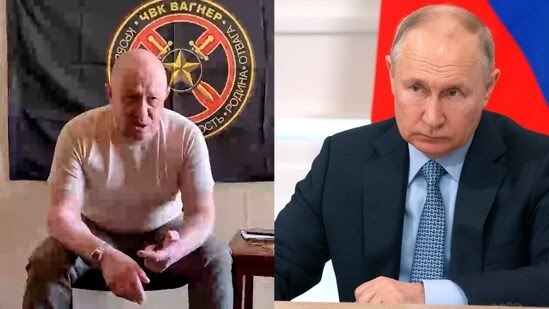Wagner leader Yevgeny Prigozhin has ordered his fighters to end their march on Moscow and return to their bases in southern Russia to averting direct clashes with the army and a potential outbreak of civil war.
The notorious warlord said that he wanted to avoid shedding Russian blood and would order his troops back to their bases instead.
“Now the moment has come when blood can be shed,” he said.
“Therefore, realising all the responsibility for the fact that Russian blood will be shed from one side, we will turn our convoys around and go in the opposite direction to our field camps.”
The decision followed negotiations with the Belarusian president, Alexander Lukashenko, Prigozhin and Lukashenko’s press services reported.
The terms appeared to include an amnesty for Wagner fighters who had participated in the insurrection, although it was not clear whether Prigozhin would still face punishment for his role in launching what was effectively the country’s first armed coup in decades.
“The negotiations lasted throughout the day,” Lukashenko’s press pool reported. “As a result, we came to an agreement on the inadmissibility of unleashing a bloody massacre on the territory of Russia.
“Yevgeny Prigozhin accepted the proposal of the president of Belarus, Alexander Lukashenko, to stop the movement of armed persons of the Wagner company on the territory of Russia and further steps to de-escalate tension,” it stated.
“At the moment, there is an absolutely beneficial and acceptable solution to the situation on the table, with security guarantees for the fighters of the Wagner PMCs.”
Wagner mercenary troops loyal to Prigozhin had been heading north in a convoy it was thought could have reached the Russian capital of Moscow by Saturday evening.
The convoy of lorries, tanks and infantry fighting vehicles had hoped to reach the capital before being intercepted by Russian regular troops, according to analysts and Russian military bloggers.
Putin promises to punish Russian mercenaries
Earlier, Russian President Vladimir Putin, had condemned an uprising by the head of a pro-Kremlin mercenary force against his Defense Ministry, vowing a decisive action against Wagner Group.
Putin made the comments in a televised address on Saturday, June 24, after Wagner chief Yevgeny Prigozhin announced that military sites in the city of Rostov-on-Don are under the control of his mercenary group.
It comes after Prigozhin declared war on the Russian Ministry of Defense, accusing the Russian military of attacking Wagner positions in Ukraine.
“Those who have organized an armed rebellion will be held accountable,” Putin said without mentioning Wagner or Prigozhin by name, “those who have been drawn into this, I call on you to stop your criminal actions.”
Putin said that the troops “who went on the path of treason will be punished and will be held accountable,” adding, “the armed forces have been given the necessary orders.”
“Personal interests have led to the betrayal of our country and the cause that our armed forces are fighting,” added Putin.
“It is a stab in the back that risked undermining Russia’s war effort in Ukraine.
The criminal charge came as Prigozhin — in a remarkable series of posts to social media — accused the Russian military’s top brass of carrying out lethal attacks on his soldiers and vowed to remove the Defense Minister Sergei Shoigu by force.
Prigozhin also claims his soldiers now control several military installations in Rostov-on-Don, a key southern Russian city that serves as a logistical base for the war effort in Ukraine.
In response, authorities have introduced “anti-terrorism operations” in the capital, Moscow, and in Rostov-on-Don to restore order.
Russia’s Defense Ministry says Wagner forces are marching to Moscow.
In an audio message on his Telegram channel, Prigozhin later said Putin is “deeply mistaken” about who is the traitor to the country and that neither he nor his fighters are about to surrender on the orders of the president, the FSB or anyone else.
Wagner forces, which number between 20,000-50,000, had been fighting alongside the regular Russian army in Ukraine, and claimed credit for taking the Ukrainian town of Bakhmut after months of bitter fighting.
Those actions have been accompanied though by Prigozhin’s near constant criticism of the Russian military’s top brass’ means and tactics.

